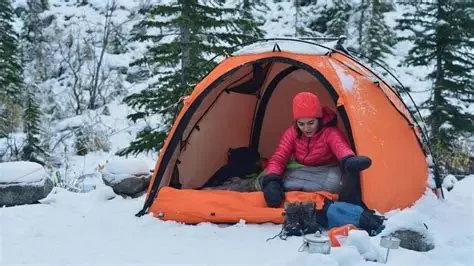Discover how to choose the right backpacking tent for solo winter adventures. Learn essential features, read real-world camping stories, and find top-rated models at Pine Cliff Resort.

- understanding-winter-backpacking-needs - Understanding the Demands of Solo Winter Backpacking
- key-features-of-a-winter-solo-tent - Key Features to Look for in a Winter Solo Tent
- real-world-performance-in-extreme-conditions - Real-World Performance in Extreme Conditions
- how-to-choose-the-right-model-for-you - How to Choose the Right Model for Your Solo Winter Adventure
- shop-with-confidence-at-pine-cliff-resort - Shop with Confidence at Pine Cliff Resort
1. Understanding the Demands of Solo Winter Backpacking
Winter camping solo is not just a physical challenge—it’s a mental and environmental test of preparedness. Between subzero temperatures, wind chill, and deep snow, every piece of gear needs to be intentional. And when it comes to shelter, choosing the right backpacking tent for solo winter adventures is arguably the most critical decision you’ll make.
Unlike summer hikes where you might get away with an ultralight mesh shelter, winter demands more: warmth retention, wind resistance, easy setup in the cold, and strong weatherproofing. The right tent doesn't just keep you dry—it keeps you alive.
2. Key Features to Look for in a Winter Solo Tent
Every experienced winter backpacker knows that not all tents are created equal. There’s a world of difference between a general 3-season model and a tent built specifically for harsh solo winter treks. Here's what really matters:
2.1 Four-Season Durability
Look for tents explicitly labeled as “four-season.” These are constructed with heavier-duty materials, reinforced poles, and geometries designed to handle snow load and heavy winds. Domed or geodesic shapes are preferred because they prevent snow accumulation and maximize wind resistance.
2.2 Efficient Ventilation
Condensation is a major issue in cold environments. Without proper airflow, moisture from your breath can freeze inside the tent walls. A quality winter tent will offer adjustable vents and dual-layer doors that help regulate temperature without letting in snow or wind.
2.3 Fast Setup in Freezing Temps
Dexterity is compromised in the cold. Tent poles should be simple to connect with gloved hands, and stakes should be optimized for snow anchoring. Freestanding designs or tents with snow skirt options give you added flexibility in frozen terrain.
2.4 Weight and Packability
Even in winter, every ounce counts—especially for solo trekkers. Aim for a balance between weight and strength. Many leading winter solo tents now pack down impressively small without compromising on structural integrity.
3. Real-World Performance in Extreme Conditions
In January 2024, seasoned solo backpacker Amanda Reese tackled the Presidential Range in New Hampshire—known for its brutal winter weather. She chose a freestanding, 4-season solo tent with a low-profile design and double-wall construction. Her feedback? “It held up during 60mph gusts, and I stayed warm with just my 15°F quilt and a sleeping pad. Setup took less than five minutes in deep snow.”
Other hikers have reported that the difference between a proper winter tent and a 3-season one becomes obvious when you're alone on a snowy ridge at 2 AM. One gear tester in the Sierra Nevada range noted his old 3-season tent collapsed under heavy snowfall, while his new winter-grade solo model withstood the weight without flinching.
4. How to Choose the Right Model for Your Solo Winter Adventure
So how do you make the right decision without falling into marketing traps? Think about your route, exposure level, and personal comfort threshold.
4.1 Assess Your Terrain and Weather Risks
Are you trekking through alpine passes or forested valleys? Tents for open alpine terrain should prioritize wind resistance and anchoring ability. Woodland hikers may favor ease of setup and stealth. Consider average snowfall, wind speeds, and temperature drops in your area of travel.
4.2 Match Tent Specs to Your Experience
If you’re newer to winter soloing, prioritize ease of use and warmth. If you’re a veteran, you might sacrifice some weight for speed or stealth. And if you’re in between, go for a model that strikes a balance—good protection without complexity.
4.3 Test Before the Big Trip
Whatever tent you choose, always do a trial run in similar weather. Set it up with gloves. Test venting and zippers. Sleep in your backyard during a cold snap. It’s better to learn its quirks when you’re close to home than while battling a mountain storm.
5. Shop with Confidence at Pine Cliff Resort
At Pine Cliff Resort, we know what it’s like to gear up for a solo winter trip. That’s why we stock a carefully selected range of high-performance backpacking tents designed for snow, wind, and extreme cold. Whether you’re a minimalist ultralight hiker or a gear-heavy survivalist, we have models that match your needs—and your experience level.
5.1 Curated Selection from Real-World Testing
Our team doesn't just read spec sheets—we test our products in real conditions across North America. From the Rockies to the Adirondacks, our gear has been pitched, pounded, and proven to work when it matters most.
5.2 Expert Help for First-Time Winter Backpackers
If this is your first solo winter adventure, our staff can help guide you through every consideration. From insulation ratings to snow anchors, we’re here to answer your questions and help you build confidence before hitting the trail.
Choosing the right backpacking tent for solo winter adventures isn’t about finding the most expensive model—it’s about finding the tent that protects you, fits your style, and supports your love for the backcountry. With Pine Cliff Resort, you're not just buying a tent—you’re preparing for unforgettable experiences in the wildest of seasons.
Lane Bay Chickee
Florida, USA
Visit Location PageTerrora Campground
Jane Hurt Yarn Rd, Tallulah Falls, GA 30573, USA
Visit Location Page